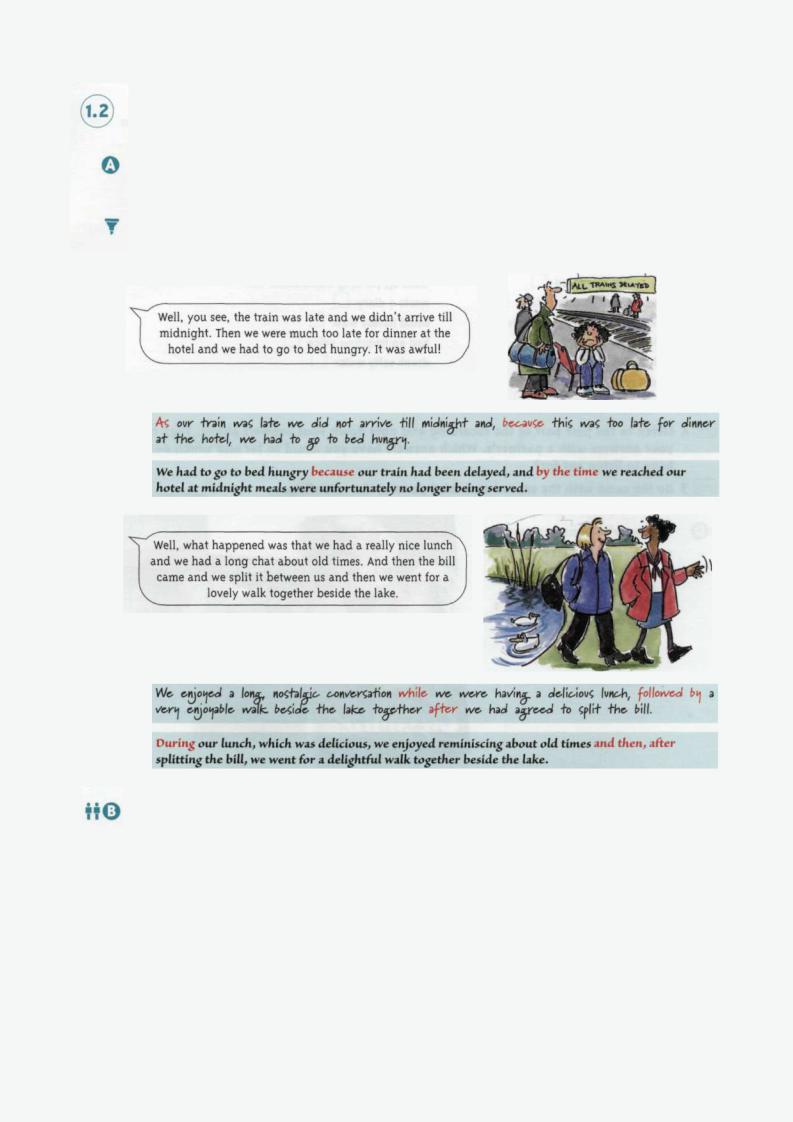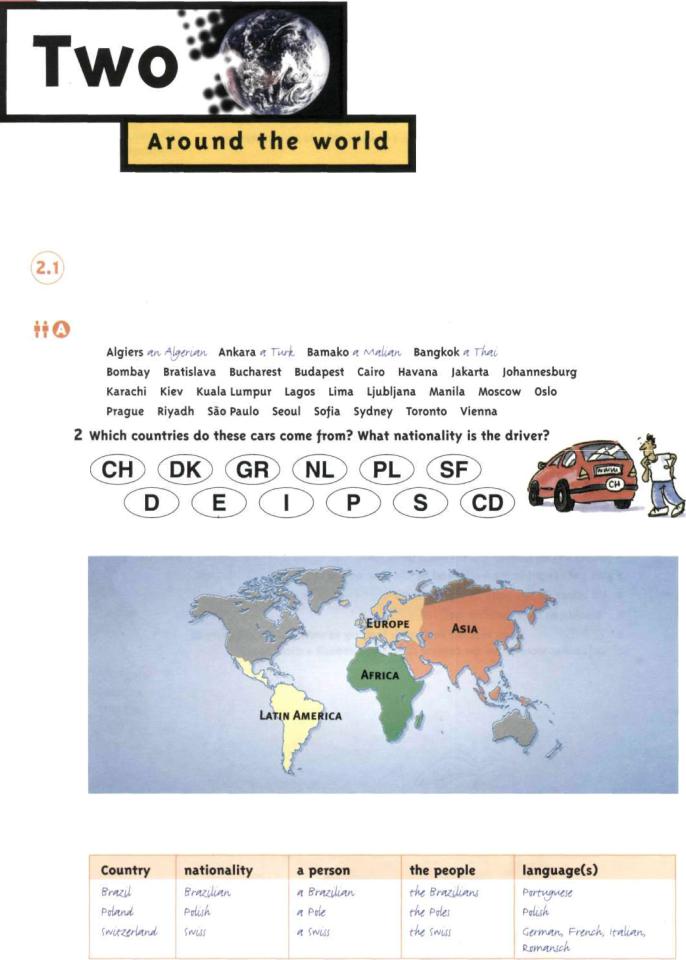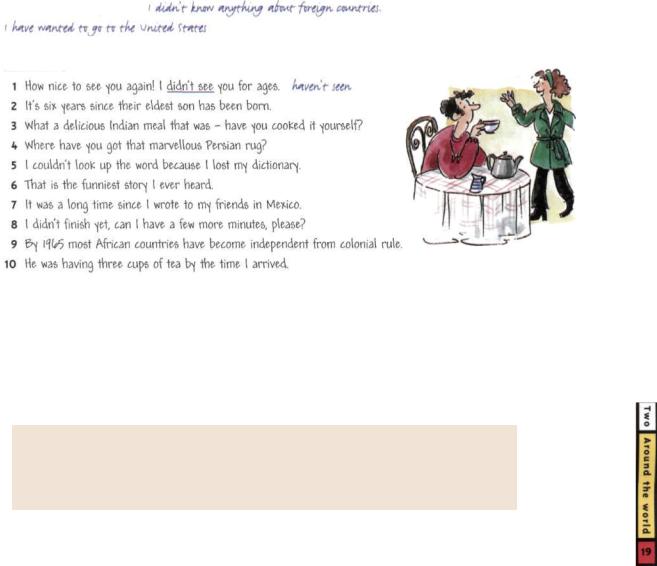
English_books / Adv_eng
.pdf
f
Joining sentences — 1
Effective writing
In a SPOKEN narrative, we usually explain the events of a story in fairly short sentences in the order they happened, using and or then to join the sentences or clauses together. In a WRITTEN account, longer, more complex sentences tend to be used.
Look at these examples. There are two written versions of each spoken narrative. Highlight the connecting words that are used. Which of the two written versions do you prefer, and why?
1 The events in these stories aren't in chronological order. Decide together on the correct order of events for each story. Take turns to retell each story, using and, but, so or then to make longer sentences:
1 They managed to swim to a nearby island. Their ship went down in a typhoon. They wanted to attract the attention of passing ships. They lit a fire on the highest point of the island. They were rescued.
A passing cruise liner spotted the smoke.
Their ship went down in a typhoon but they managed to swim to a nearby island. They wanted
to attract the attention of passing ships, so they lit a fire on the highest point of the island. A passing cruise liner spotted the smoke and they were rescued.
2I arrived late for work. I couldn't get the car to start. It was a cold, damp morning. I had to push the car down the hill. I managed to start the engine. I jumped into the car. The car gathered speed.
3Her interest in politics made her decide to stand for parliament. She won the by-election with a large majority. She gave up politics for good. She lost at the next general election.

New Cambridge Advanced English
4 They got home very late. They spent a long time drinking coffee and talking. They went dancing together. They went to a cafe together.
5Our plane didn't take off. The airport was closed because of fog. Many flights were delayed. Inconvenience was caused to hundreds of passengers. We had to spend the night in the departure lounge.
6The kidnappers were caught by the police. All ports and airports were being watched. The kidnappers were trying to get out of the country. The hostages were released. The ransom money was paid.
Rewrite each story in Bl as one or two long sentences. But CHANCE EACH ENDING, substituting a happy end for an unhappy end and vice versa — as in this example:
They manayed to swwn f^ ^ nearby island after their shop hadvone down, on a typhoon. As they wanted to attract the attention of passony ships, they lot a fire, b*t theor signals went wmtooed and none of tnem s^rvoved.
Use some of the following connecting words and alter some of the verb forms as necessary
(e . g . did to had done).
after |
although |
and then |
as as soon as |
because before but by the time eventually |
finally |
however |
in the end |
once since |
so so that subsequently until when which |
while |
|
|
|
|
Rewrite these notes in complete sentences, using suitable connecting words:
1 ship went down — hurricane — nearly drowned
They were nearly drowned after their shy hadjone down on a hurricane.
2found driftwood - built bonfire - beach - caught fish - grilled - fire
3gathered palm leaves - built rough shelter
4sleepless night - insects - began lose heart
5made mosquito nets — protect themselves — next night
6found wild bananas, very glad - hillside - ate them - started look - drinking water
7couldn't find fresh water - afraid not survive on island
8hoped collect rainwater — but so little rain — in despair
9build raft from remaining driftwood - set sail across ocean
10 raft started sink - man-eating sharks began circle ominously round
Writing a narrative
Creative writing
Select just ONE of these opening lines and use it to begin your own desert island story (about 250 words). Make notes of the ideas you would like to include.
Write the first part of your narrative on one sheet of paper - but write the LAST PARAGRAPH on a SEPARATE sheet of paper.
Show the first page of your story to your partners (WITHOUT the last paragraph). Ask them to suggest what might come next. Do their ideas agree with what you had in mind?
Finally, show them your last paragraph and ask for their comments.

The Castaways
Reading
1Ask your partners:
•if life on a desert island would be wonderful - or a nightmare
•why they think desert islands are popular in fiction and movies
2Fill the gaps in these sentences with suitable words from the list below. Look up any unfamiliar words in a dictionary.
1 |
As Lucy and Gerald were resourceful |
people they stood a good chance of |
in difficult |
|
|
. But the longer they were alone together the more the |
between them grew |
||
|
and they got on each other's |
. |
|
|
2 |
In Shakespeare's The Tempest (1610) some sailors are |
on a |
island, where the |
|
|
magician Prospero and his daughter Miranda live. Prospero rules the island's natural creatures, |
|||
|
including the good spirit Ariel and the evil monster Caliban. |
|
|
|
3 In Daniel Defoe's Robinson Crusoe (1719) the hero, after living many years in |
, finds a |
|||
|
who becomes his |
|
|
|
4 In Robert Louis Stevenson's Treasure Island (1883) a man is |
after many |
|||
|
years on an island where he had been abandoned by |
|
|
|
Listen to the recording as you read this poem:
T H E CASTAWAYS OR VOTE FOR CALIBAN
The Pacific Ocean -
A blue demi-globe.
Islands like punctuation marks.
A cruising airliner,
Passengers unwrapping pats of butter.
A hurricane arises,
Tosses the plane into the sea.
Five of them, flung on to an island beach,
Survived.
Tom the reporter.
Susan the botanist.
Jim the high-jump champion.
Bill the carpenter.
Mary the eccentric widow.
Tom the reporter sniffed out a stream of drinkable water. Susan the botanist identified a banana tree.
Jim the high-jump champion jumped up and down and gave them each a bunch.
Bill the carpenter knocked up a table for their banana supper. Mary the eccentric widow buried the banana skins,
But only after they had asked her twice. They all gathered sticks and lit afire. There was an incredible sunset.
Next morning they held a committee meeting.
Tom, Susan, Jim and Bill
Voted to make the best of things.
Mary, the eccentric widow, abstained.
Tom the reporter killed several dozen wild pigs.
Tanned their skins into parchment
And printed the Island News with the ink of squids.
_

New Cambridge Advanced English
Susan the botanist developed new strains of banana
Which tasted of chocolate, beefsteak, peanut butter,
Chicken and bootpolish.
Jim the high-jump champion organised organised games
Which he always won easily.
Bill the carpenter constructed a wooden water wheel
And converted the water's energy into electricity.
Using iron ore from the hills, he constructed lampposts.
They all worried about Mary, the eccentric widow,
Her lack of confidence and her -
But there wasn't time to coddle her.
The volcano erupted, but they dug a trench
And diverted the lava into the sea
Where it formed a spectacular pier.
They were attacked by pirates but defeated them
With bamboo bazookas firing
Sea-urchins packed with home-made nitro-glycerine.
They gave the cannibals a dose of their own medicine
And survived an earthquake thanks to their skill in jumping.
Tom had been a court reporter
So he became the magistrate and solved disputes.
Susan the Botanist established
A university which also served as a museum.
Jim the high-jump champion
Was put in charge of law enforcement -
Jumped on them when they were bad.
Bill the carpenter built himself a church,
Preached there every Sunday.
But Mary the eccentric widow . . .
Each evening she wandered down the island's main street,
Past the Stock Exchange, the Houses of Parliament,
The prison and the arsenal.
Past the Prospero Souvenir Shop,
Past the Robert Louis Stevenson Movie Studios,
Past the Daniel Defoe Motel
She nervously wandered and sat on the end of the pier of lava,
Breathing heavily,
As if at a loss,
As if at a lover,
She opened her eyes wide
To the usual incredible sunset.
by Adrian Mitchell
1Highlight any unfamilar words using a fluorescent highlighter and, if necessary, look them up in a dictionary.
2For TWO of the five characters in the poem, make notes on the following points. Begin by using a pencil to mark all the references to your characters in the poem.
•useful things he or she accomplished
•useless or pointless things he or she did
•why you admire or sympathise with him or her (or why you find him or her objectionable or unlikeable)
3Compare your ideas. Then find out from your partners:
•what their impressions of the poem are
•which character they sympathise with most - and why
•what they think the poem is about, beneath the surface of the narrative
4Write a paragraph (about 100 words) about your impressions of the poem and explain what you like and/or don't like about it.
Highlighting new words or phrases in the context you first met them will help you to remember them more easily. But highlight just the new word or phrase not the whole
sentence.

Survival
Interview
You'll hear an interview with Pen Hadow, who leads expeditions to the Arctic. Fill in the missing information by writing a word or phrase in the notes below.
Pen Hadow enjoys being in the Arctic because one can , |
oneself — as well as seeing the |
|||
wildlife and landscape. |
|
|
|
|
He doesn't enjoy 2 |
. |
|
|
|
He has made two 3 |
on the north geographic pole. You can avoid making mistakes under |
|||
pressure if you are 4 |
|
|
|
|
You're more likely to suffer from hypothermia if you 5 |
|
|
||
He was crossing the Denmark Strait in a small rubber boat when both their 6 |
seized. |
|||
They drifted more deeply into the 7 |
as the sea became 8 |
|
|
|
They didn't use their search and rescue beacon because 9 |
|
|
||
To prevent themselves being swept overboard they 10 |
|
|
||
His colleague was suffering from11 |
|
|
|
|
After 12 |
adrift they found themselves within |
of their final destination. |
||
Pen Hadow's ideal desert island would be in 14
He'd be perfectly happy surviving there alone for 15
How would you and your partners cope if you found yourselves together on a desert island in the tropics? Decide together:
*what useful skills you possess between you, which you could use if you were on a desert island — make a list
•what qualities you would hope for in a fellow castaway — make a list * what basic supplies you'd need on a desert island as survival rations
•what TEN luxury items you'd like to have with you on the island

All's well that ends well!
Idioms and collocations
Replace the phrases in red with one of the expressions below.
1 Taking everything into consideration, I wouldn't like to be a castaway.
|
All in all |
2 |
There were palm trees on every part of the island. |
3 |
'If it doesn't matter to you, I'd like to borrow this book.' 'Certainly.' |
4 |
A two-week holiday on Tahiti costs €1499, including everything. |
New Cambridge Advanced English
Each unit in this book has a section on idioms and collocations, or verbs and idioms (including phrasal verbs). These sections introduce you to a range of useful expressions so that, with time, you can incorporate them into your active vocabulary.
5They were completely exhausted after swimming to the island.
6Suddenly and unexpectedly they heard an explosion and the ship started to sink Miraculously, everyone except the captain survived.
7If nothing goes wrong my plane will arrive just before lunch.
8The film wasn't brilliant but it was just about satisfactory, I suppose.
9'How are you feeling?' 'Much better, I'm feeling fine today, thanks.'
10 I enjoyed the story but nevertheless I felt a little cheated by the ending.
11There were 187 passengers on board altogether and they tried to get into the lifeboat at the same time.
12To begin with, in an emergency, remember, this is important, don't panic!
above all |
all at once all at once |
all being well |
all but all in |
all in |
all in all У all over |
all right |
all right all the same |
all told / in all |
by all means |
first of all |
it's all the same |
Fill these gaps with suitable expressions from the list above.
1learning new idioms and expressions is worth the effort. Secondly . . .
2I'll meet you tomorrow evening at 8 o'clock,
3 |
If you want to read a book, I don't mind at all: it's |
to me. |
|
4 |
Going out on Sunday sounds like a good idea. |
, I don't think I'll join you |
|
5 We got caught in the traffic and by the time we arrived it was |
|||
6 |
I'd rather do this work by myself, if it's |
|
to you. |
7 |
'Would you mind helping me?' ' |
.' |
|
8 |
when reading an English text, try to work out the meaning of |
||
unfamiliar words from the context before you consult a dictionary.
Highlight any expressions that are new
to you.

United nations
Vocabulary
1 What would you call a person from each of these cities?
3 Write down the names of FIVE more countries in each of these regions:
Think of TEN countries which you think are important or interesting - or difficult to remember in English. Make a chart like this:
Find out which are the FIVE countries in the world which your partners would most like to visit one day. Ask for their reasons.

New Cambridge Advanced English
(2.2) World Music
1Read the record review above - does it sound like the kind of music you'd like?
2You'll hear part of a broadcast about World Music. Match the names of the musicians with their country of origin.
Ali Farka Toure |
Algeria |
Elio Reve |
Brazil |
Fong Naam |
Chile |
Gilberto Gil |
Colombia |
Inti lllimani |
Congo |
Joe Arroyo |
Cuba |
Juan Luis Guerra |
Dominican Republic |
Khaled |
Greece |
Ladysmith Black Mambazo |
Hungary |
Marta Sebestyen |
Mali |
Nikos Ksidakis |
Mali |
Nusrat Fateh Ali Khan |
Pakistan |
Oumou Sangare |
Panama |
Papa Wemba |
Senegal |
Paul Simon |
South Africa |
Ruben Blades |
Thailand |
Youssou N'Dour |
USA |
3 Listen to the recording again and fill the gaps by writing one word in each space:
1 |
World Music is |
|
music from |
other than Western Europe and the USA. |
|
2 |
It has been referred to as |
traditional music - still being |
and enjoyed, |
||
|
not being |
or |
rediscovered. |
|
|
3 |
Most modern American popular music is rooted in |
|
|
||
4 |
Anglo-American popular music is more |
and commercialised - World Music is more alive |
|||
|
and |
. |
|
|
|
5 |
Many West African musicians belong to |
who have been making music for |
|||
6Soukous and salsa music makes you want to
7The music of the Andes and Hungary is very
8 |
Asian music uses different |
from Western music. |
|
9 |
The term 'World Music' was |
by a group of record |
to help buyers to know |
|
where to find such recordings in a record shop. |
|
|
10 |
Peter Gabriel's motto is 'High-tech and |
'. |
|
Ask your partners to describe what kinds of music from foreign countries - including the USA and the UK - they enjoy listening to and why.

The past — 1
Look at these groups of sentences. What's the difference in meaning between the sentences |
|
i n each group? |
1 ^ |
1When we heard the song we started singing. When we had heard the song we started singing.
2 |
Did you enjoy your holiday} |
Have you enjoyed your holiday) |
3 |
I never enjoyed travelling alone. |
I've never enjoyed travelling alone |
|
I had never enjoyed travelling alone. |
I never enjoy travelling alone. |
4 |
She lived abroad for two years. |
She has lived abroad for two years. |
|
She had lived abroad for two years. |
She still lives abroad after two years. |
First, match these MEANINGS ( a - f ) with the verbs in red in the numbered examples (1-6) and write the letter in the little boxes (1-6) on the right:
aThe CAUSE of an event or situation that people already know about
bActions or events that happened BEFORE a particular past event
cRecent events that have RESULTS in present time
dActions or events that happened within an AS-YET-UNFINISHED period
eEvents or actions that happened at a DEFINITE time in the past
fREPORTING what someone said or asked about a past event or action
Then fill the  in the incomplete sentences.
in the incomplete sentences.
Then 
S i m p l e |
p a s |
t |
|
|
|
|
|
|
|
|
|
|
|
|
|
|
|
|
|
|
|
|
|
|
|
|
|
|
|||||||
1 |
She w a s born in India a n d came to Britain w h e n she w a s |
18. |
|
|
|
|
|
|
|
|
1 |
||||||||||||||||||||||||
|
|
|
|
|
|
|
|
|
|
|
|
|
|
|
|
|
|
|
|
|
|
|
|
|
|
|
|
|
|
|
|||||
|
She |
|
|
|
|
|
learning English six years a g o w h e n she |
|
|
|
twelve years |
old |
. |
|
|
||||||||||||||||||||
|
|
|
|
|
|
|
|
|
|
|
|||||||||||||||||||||||||
|
|
|
|
|
|
|
|
|
|
|
|
|
|
|
|
|
|
|
|
|
|
|
|
|
|
|
|
|
|
|
|
|
|
|
|
|
|
|
|
|
|
|
|
|
|
|
|
that p r o g r a m m e about Japan on TV last night? |
|
|
|
|
|
|
|||||||||||||||||
|
|
|
|
|
y o u |
|
|
|
|
||||||||||||||||||||||||||
|
|
|
|
|
|
|
|
|
|
|
|
|
|
|
|
|
|
|
|
|
|
|
|||||||||||||
2 |
Look over there: s o m e o n e has broken a w i n d o w . I w o n d e r w h o d i d |
it? |
|
||||||||||||||||||||||||||||||||
|
2 |
||||||||||||||||||||||||||||||||||
|
|
|
|
|
|
|
|
|
|
|
|
|
|
|
|
|
|
|
|
|
|
|
|
|
|
|
|||||||||
|
What a lovely p h o t o g r a p h |
! |
|
|
|
|
|
|
|
|
|
|
|
|
it |
yourself? |
|
|
|
|
|
|
|
|
|||||||||||
|
|
y o u |
|
|
|
|
|
|
|||||||||||||||||||||||||||
P r e s e n t p e r f e c t |
|
|
|
|
|
|
|
|
|
|
|
|
|
|
|
|
|
|
|
|
|
|
|
|
|
|
|||||||||
3 |
She has w o r k e d hard all |
her life. |
|
|
|
|
|
|
|
|
|
|
|
|
|
|
|
|
|
|
|
|
|||||||||||||
|
I haven't seen her recently. |
|
|
|
|
|
|
|
|
|
|
|
|
|
|
|
|
|
3 |
||||||||||||||||
|
|
|
|
|
|
|
|
|
|
|
|
|
|
|
|
|
|
|
|
|
|
|
|
|
|
|
|
|
|
|
|
||||
|
|
|
|
|
|
|
|
|
|
|
|
|
|
to |
the USA? |
|
|
|
|
|
|
|
|
|
|
|
|
|
|
|
|
||||
|
|
|
|
|
y o u ever |
|
|
|
|
|
|
|
|
|
|
|
|
|
|
|
|
|
|||||||||||||
|
|
|
|
|
|
|
|
|
|
|
|
|
|
|
|
|
|
|
|
|
|
|
|
|
|||||||||||
|
|
|
|
|
|
|
|
|
|
Lucy Irvine's n e w book? |
|
|
|
|
|
|
|
|
|
|
|
|
|||||||||||||
|
|
|
|
|
y o u |
|
|
|
|
|
|
|
|
|
|
|
|
|
|||||||||||||||||
|
|
|
|
|
|
|
|
|
|
|
|
|
|
||||||||||||||||||||||
4 |
I've just returned from a |
l o n g trip, so I |
don't feel |
like travelling anywhere |
. |
|
|
|
4 |
||||||||||||||||||||||||||
|
|
|
|
|
|
|
|
|
|
|
|
|
|
|
|
|
|
||||||||||||||||||
|
I heard |
on the n e w s today that there |
|
|
|
|
|
|
|
a terrible earthquake in China |
|
|
|
|
|||||||||||||||||||||
|
|
|
|
|
|
|
|
|
|
|
|
|
|
|
|
|
|
|
|
|
|
|
|
|
|||||||||||
|
a n d thousands of p e o p l |
e |
|
|
|
|
|
killed. |
|
|
|
|
|
|
|
|
|
|
|
|
|
|
|
|
|||||||||||
P a s t p e r f e c t |
|
|
|
|
|
|
|
|
|
|
|
|
|
|
|
|
|
|
|
|
|
|
|
|
|
|
|||||||||
5 |
It w a s very cold w h e n he got to M o s c o w because winter had (already) arrived. |
|
|
|
|
||||||||||||||||||||||||||||||
|
My car w o u l d n ' t start this m o r n i n g because I had left the lights on all night. |
|
5 |
||||||||||||||||||||||||||||||||
|
He |
|
|
|
|
get on the p l a n e because he |
|
|
|
|
his passport. |
|
|
|
|
||||||||||||||||||||
6 |
She said she had been in |
Burma in 1988 but that she had never been to India. |
|
6 |
|||||||||||||||||||||||||||||||
|
We asked h i m w h y he |
|
|
|
|
|
to the party the previous w e e k e n d . |
|
|
|
|
||||||||||||||||||||||||
In some cases the past perfect is optional. There's no difference in meaning between:
After I had been to Japan, I spent a week in Korea.
and
After I went to Japan, I spent a week in Korea.

New Cambridge Advanced English
1 Look at these examples - the verbs are in red and the time expressions are in blue:
Time expressions
Some time expressions are not normally used with the present perfect but with the SIMPLE PAST (or past perfect):
In 1989 Japan overtook the USA as the world's richest nation.
Did you see that documentary about South Africa on TV the other day?
Some are not normally used with the simple past but with the PRESENT PERFECT (or past perfect): / haven't been abroad since January.
Have you seen any good TV programmes lately?
Some can be used either with the SIMPLE PAST or the PRESENT PERFECT, depending on the situation:
'Have you ever been to Kenya)' 'Yes, I have. I went there earlier this year.' 'Did you ever go to Mombasa while you were in Kenya)'
A few are normally only used with the PAST PERFECT:
He had booked his tickets a few days before.
We were worried because she hadn't arrived by 11 o'clock.
2 Arrange the time expressions below into four lists:
1 |
used with SIMPLE PAST |
3 |
used with either SIMPLE PAST or PRESENT PERFECT |
|
|||||
2 |
used with PRESENT PERFECT |
4 |
used with PAST PERFECT |
|
|
||||
already |
a little while earlier |
a long time ago |
a moment ago |
all my life always at midnight |
|||||
by midnight by now |
by the end of the year |
for two months |
in the morning |
in 1997 |
just now |
||||
last year |
never not long ago |
not long before that recently |
so far still |
this afternoon |
|||||
this week |
this year |
till now |
till midnight |
until today when I was younger |
yesterday |
yet |
|||
3Write only the BEGINNINGS of four sentences and the ENDINGS of four more sentences, using the time expressions above. Ask your partner to complete them, like this:
When I was younger ...
...all my life.
Underline the mistakes in these sentences and then correct them.
Ask your partners:
•what foreign countries they have travelled to and what their impressions were of the place, the people and the lifestyle
•what they consider to be the most significant international events that have happened during their lifetime, and why
•what the most significant international events this year have been
Many of the time expressions on this page are also used when referring to the present or future:
/'// see you in the morning.
I have a shower in the morning. Let's meet this afternoon.
I have a meeting this afternoon.
